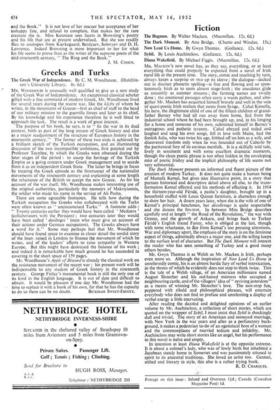Fiction
Diana Wakefield. By Michael Figgis. (Macmillan. 12s. 6d.) MR. MACKEN 'S new novel has, as they say, everything, or at least everything that could properly be expected from a novel of Irish rural life at the present time. The story, comic and touching by turn, always keeps a surprise or two up its sleeve ; the dialogue—decked out in discreet phonetic spelling—is free and flowing and so spon- taneously Irish as to seem almost stage-Irish; the anecdotes glide as smoothly as summer streams ; the farming scenes are vividly done ; the emotional passages often carry a warm pathos, and alto- gether Mr. Macken has acquitted himself bravely and well in the vein of quasi-poetic Irish realism that stems from Synge. Cahal Kinsella, his hero, the illegitimate child of one of the fifteen children of grand- father Barney who had all run away from home, fled from the industrial school where he had been brought up, and, in his longing for a home and someone of his own, submitted himself to Barney's outrageous and pathetic tyranny. Cahal obeyed and toiled and laughed and sang his own songs, fell in love with Make, had the foolish Julia, who was twice his age, fobbed off on him as a wife, and discovered freedom only when he was hounded out of Caherlo by the puritanical fury of its envious menfolk. It is a skilfully told tale, lively in sentiment and with some excellent dramatic moments, though the clean poetic phrase is too often hidden in the enveloping mist of poetic Irishry and the implicit philosophy of life seems not very substantial.
The Dark Moment presents an informed and fluent picture of the creation of modem Turkey. It does not quite make a human being of Mustafa Kemal, but gives nice illustrative point, in a story that pursues historical and descriptive detail above all else, to the trans- formation Kemal effected and his methods of effecting it. In 1914 the thirteen-year-old Feria, a pasha's daughter, brought up in a household stuffed with Louis Quinze furniture, is shameless enough to show her hair. A dozen years later, when she is the wife of one of Kemal 's principal henchmen, her décolletage is quite respectable and she dances the fox-trot. In between Miss Bridge describes carefully and at length" the Road of the Revolution," the war with Greece, and the growth of Ankara, and brings back to Turkey Feride's English friend Fanny, who is obliged at the last, though with some reluctance, to flee from Kemal 's too pressing attentions. War and diplomacy apart, the emphasis of the story is on the feminine aspect of things, admittedly always a major one, and the telling keeps to the surface level of character. But The Dark Moment will interest the reader who has seen something of Turkey and a good many others besides.
Mr. Gwyn Thomas is as Welsh as Mr. Macken is Irish, perhaps even more so. Although the inspiration of Now Lead Us Home is unrelievedly comic, his is an almost bardic fury of verbal intoxication, in the throes of which he evidently does not stop to think twice. This is the tale of a Welsh village, of an American millionaire named August Slezecher and his red-haired mistress who occupied a neighbouring castle, and of the villagers' idea of" reviving jesterdom" as a means of winning Mr. Slezecher's love. The non-stop fun, peppered with ribald and philosophical phrases, will entertain everybody who does not find so profuse and unrelenting a display of verbal energy a little enervating.
After reading the dazzled and delighted opinions of an earlier volume by Mr. Auchincloss, a collection of short stories, which are quoted on the wrapper of Sybil, I must insist that Sybil is shockingly dull and trivial. The story of an American and moneyed marriage, with New York in the war years and after as a perfunctory back- ground, it makes a pedestrian to-do of an egotistical bore of a woman and the commonplaces of married tedium and infidelity. Mr. Auchincloss may write short stories like an angel, but his performance in this novel is naive and empty. In intention at least Diana Wakefield is at the opposite extreme. It is about a colonel's lady, who was of lowly birth but inhabited a Jacobean stately home in Somerset and was passionately attuned in spirit to its ancestral traditions. She loved an artist too. Genteel, stilted and literary in style, this also is a miller trying book.
R. D. CHARQUES.


































 Previous page
Previous page